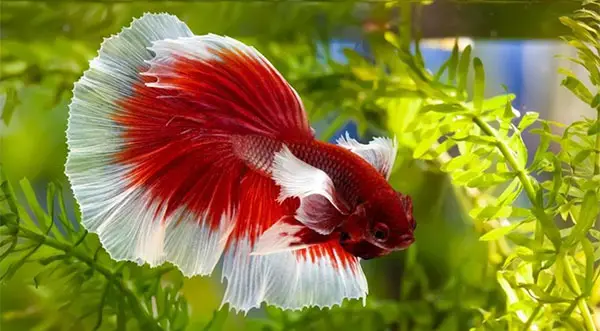Originally posted on May 13, 2023 @ 1:00 pm
Last Updated on 5 months by admin
Betta fish are a popular pet among fish enthusiasts, known for their vibrant colors and flowing fins. However, like any living creature, betta fish eventually come to the end of their lives. A common question among betta fish owners is whether their fish will sink to the bottom of the tank when they die.
The answer to this question is not straightforward. While it is true that many betta fish will sink to the bottom of the tank when they die, there are also instances where they may float. In this article, we will explore the reasons behind why betta fish may sink or float after they pass away and what it means for their owners.
Yes, betta fish usually sink when they die. This is because they lack the buoyancy control that live fish have, and once they pass away, their body becomes heavy and sinks to the bottom of the tank. It is important to remove the dead fish as soon as possible to prevent any contamination in the water.

Do Betta Fish Sink When They Die?
Betta fish are popular aquarium pets due to their vibrant colors and easy care. However, like any other living creature, they eventually pass away. One question that often arises among betta fish owners is whether these fish sink or float when they die. In this article, we will explore this topic and provide you with all the information you need to know.
Do Betta Fish Sink or Float When They Die?
When a betta fish dies, it can either sink or float. The outcome depends on the cause of death. If the fish died due to natural causes or old age, it will most likely sink to the bottom of the tank. This is because the fish’s muscles relax, making it difficult for them to maintain their buoyancy. However, if the fish died due to a disease or other health issues, it may float to the top of the tank.
If your betta fish has died, it is essential to remove it from the tank immediately to prevent any contamination from the decaying body. Leaving a dead fish in the tank can cause ammonia levels to rise rapidly, which can harm any other fish in the tank.
What Causes Betta Fish to Die?
There are several reasons why betta fish may die. The most common causes of death include poor water quality, overfeeding, and diseases. Here are some details about each of these causes:
- Poor Water Quality: Betta fish are sensitive to changes in water conditions. Poor water quality can lead to stress, which weakens the fish’s immune system and makes it more susceptible to diseases.
- Overfeeding: Overfeeding your betta fish can lead to digestive problems, which can cause stress and ultimately lead to death.
- Diseases: Betta fish can contract various diseases, such as fin rot, velvet disease, and ich. These diseases can be caused by poor water quality, stress, or other factors.
How to Prevent Betta Fish Deaths
Preventing betta fish deaths requires proper care and attention. Here are some tips to help keep your betta fish healthy and happy:
- Provide a Suitable Environment: Bettas require a specific environment to thrive. They need a tank that is at least 5 gallons in size and has a filter and heater to maintain stable water conditions.
- Maintain Water Quality: Regular water changes and water testing can help keep water quality in check and prevent stress-related illnesses.
- Feed Appropriately: Bettas only need to be fed once or twice a day, and only a small amount of food is required. Overfeeding can cause digestive problems, as mentioned earlier.
- Observe Your Fish: Pay attention to your betta fish’s behavior and appearance. If you notice anything unusual, such as lethargy, loss of appetite, or unusual growths, seek veterinary care immediately.
Benefits of Owning a Betta Fish
Betta fish are fantastic pets that can provide many benefits to their owners. Here are a few of these benefits:
- Low Maintenance: Betta fish are easy to care for and require minimal maintenance compared to other pets.
- Beautiful to Look at: Bettas come in a wide range of colors and have long, flowing fins that make them a beautiful addition to any home or office.
- Relaxing: Watching fish swim in an aquarium can be incredibly relaxing and therapeutic, making it an excellent stress-reliever.
Betta Fish vs. Other Fish
Compared to other fish, betta fish have some advantages and disadvantages. Here are some comparisons:
| Advantages of Betta Fish | Disadvantages of Betta Fish |
|---|---|
| Easy to care for | Can be aggressive towards other fish |
| Beautiful colors and fins | Requires specific tank conditions |
| Low maintenance | May require a heater and filter |
In conclusion, when a betta fish dies, it can sink or float, depending on the cause of death. To prevent betta fish deaths, proper care and attention are necessary, including maintaining water quality, providing a suitable environment, and observing your fish for any signs of illness. Despite the potential challenges, owning a betta fish can provide many benefits and be a rewarding experience.
Frequently Asked Questions
Betta fish are one of the most popular fish in the aquarium trade. They are known for their vibrant colors, long fins, and unique personalities. However, one question that many people ask is whether betta fish sink when they die. Here are some answers to this common question.
Do betta fish sink when they die?
Yes, betta fish typically sink when they die. This is because their bodies become denser than water, causing them to sink to the bottom of their tank. However, there are some exceptions to this rule. For example, if a betta fish dies in shallow water, it may remain near the surface of the tank.
If you notice that your betta fish has died and is sinking to the bottom of the tank, it is important to remove it as soon as possible. Leaving a dead fish in the tank can cause the water quality to deteriorate, which can be harmful to any remaining fish in the tank.
Why do betta fish sink when they die?
Betta fish sink when they die because of the changes that occur in their bodies after death. When a fish dies, its muscles relax and its body becomes limp. As a result, the fish’s density increases, causing it to sink to the bottom of the tank.
In addition to changes in the betta fish’s body after death, water temperature can also play a role in whether a dead fish sinks or floats. Colder water is denser than warmer water, so a dead fish in cold water is more likely to sink than a dead fish in warm water.
Should I be concerned if my betta fish sinks when it dies?
If your betta fish sinks when it dies, it is a natural occurrence and not a cause for concern. However, it is important to remove the dead fish from the tank as soon as possible to prevent any negative effects on water quality.
If you notice that multiple fish are sinking to the bottom of the tank, it may be a sign of poor water quality or an underlying health issue. In this case, it is important to test the water quality and consult with a veterinarian or fish expert to address any potential issues.
What should I do if my betta fish dies?
If your betta fish dies, it is important to remove it from the tank as soon as possible. Leaving a dead fish in the tank can cause ammonia levels to rise, which can be harmful to any remaining fish in the tank.
Once you have removed the dead fish, it is important to thoroughly clean the tank and any equipment to prevent the spread of disease or infection. You may also want to consider testing the water quality and consulting with a veterinarian or fish expert to ensure that your remaining fish are healthy and happy.
Can betta fish float when they die?
Yes, betta fish can float when they die. While sinking to the bottom of the tank is the most common occurrence, a betta fish may float to the surface if it dies in shallow water or if the water temperature is warm enough to counteract the increased density of the fish’s body after death.
If you notice that your betta fish has died and is floating at the surface of the tank, it is important to remove it as soon as possible to prevent any negative effects on water quality.

10 ways to tell if a betta fish is dying – Betta fish informational video
In conclusion, the answer to the question “Do Betta Fish sink when they die?” is not a simple yes or no. It depends on the circumstances surrounding their death. If a Betta Fish dies from natural causes, it is likely that they will float to the surface due to the gases produced during the decomposition process.
However, if a Betta Fish dies due to a sudden shock or trauma, they may sink to the bottom of the tank. It is important to monitor your Betta Fish regularly and ensure they are in a healthy environment to minimize the risk of sudden deaths.
Regardless of whether a Betta Fish sinks or floats when they die, it is important to provide them with proper care and respect. These beautiful and unique creatures deserve a peaceful and comfortable life, and it is our responsibility as pet owners to ensure that they receive it.
